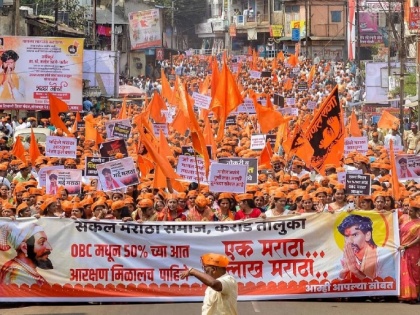Bombay High Court: 'Maratha Community Cannot Be Considered Economically Backward'
By Lokmat English Desk | Published: February 22, 2024 11:45 AM2024-02-22T11:45:16+5:302024-02-22T11:52:17+5:30
Mumbai: The Maratha reservation law was made based on social and educational backwardness. In contrast, the law was enacted ...

Bombay High Court: 'Maratha Community Cannot Be Considered Economically Backward'
Mumbai: The Maratha reservation law was made based on social and educational backwardness. In contrast, the law was enacted to provide 10 percent reservation for economically backward classes (EWS) based on family income and other economic backwardness. As a result, the High Court has ruled that the Maratha community cannot be declared economically backward as there is a difference between the two laws. It also refused to grant relief to the four petitioners from the Maratha community who had sought appointment in the judicial service from the EWS category after the Supreme Court decided to scrap the Maratha reservation.
The petitioners had applied under the SEBC Act. A division bench of Justice Anil Chandurkar and Justice Jitendra Jain, while dismissing the petitioners' pleas, said the government's decision to deny appointment to the petitioners from the EWS category was correct. The petitioners had challenged the state government's decision to deny appointment as a junior divisional civil judge and first class magistrate. On the date on which the advertisement for these posts was issued, the applicants could not seek exemption on the ground that their age was more than the qualifying age and they belonged to economically backward classes. Therefore, the petitioners were informed by the state government that they could not be considered for these posts. The petitioners had moved the High Court against it.
The Maharashtra Public Service Commission (MPSC) released the advertisement for the above posts on February 1, 2019. The age limit for lawyers was 35 years with three years of practice, and for those who had just entered the legal field after completing law school, the age limit was 25 years. Similarly, as per the rules, if the candidate is from a backward class, the age limit will be relaxed by another five years, the advertisement said.
On November 30, 2018, the state government enacted a law to provide 16 percent reservation to the Maratha community in government jobs and education. The High Court upheld the government's decision. However, it suggested bringing the reservation percentage down to 13 percent. The decision was challenged in the Supreme Court. Initially passing an interim order in the matter, reservation should not be implemented for public services and posts under the government after September 9, 2020. But the Supreme Court had made it clear that previous appointments were protected. Therefore, the petitioners appeared for the examination for the above posts and they were also qualified. Later, on May 21, 2021, the Supreme Court declared the Maratha reservation unconstitutional and struck it down.
The appointment of qualified petitioners was delayed due to the covid-19. The petitioners, therefore, had sought appointment from the economically backward classes. The state government had announced a 10 percent reservation for economically backward classes in government jobs and education. The Supreme Court struck down the Maratha reservation. Subsequently, on July 15, 2021, the government promulgated a new ordinance allowing Maratha candidates to avail the benefits of reservation from economically backward classes. On the basis of this, the petitioners had sought an appointment from the EWS category.
Open in app